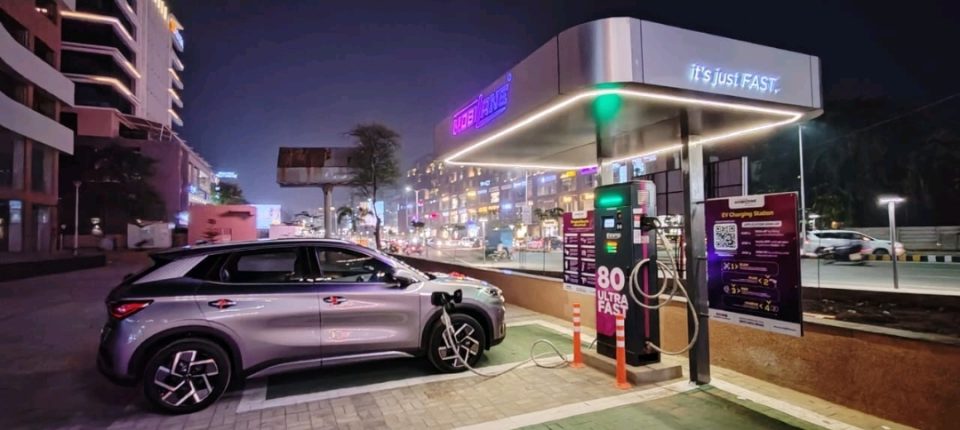Electric mobility in India is experiencing an unprecedented transformation. Moreover, at the heart of this revolution lies a critical challenge that affects every potential EV owner. Range anxiety continues to dominate purchase decisions across urban and rural markets alike. However, innovative companies like EVamp Technologies are reshaping customer expectations through strategic funding and customer-centric solutions.
EVamp Technologies recently secured ₹7 crore in its first funding round, specifically targeting expansion of its Mobilane charging network. Furthermore, this investment represents more than just capital infusion. It signals a fundamental shift toward sustainable, customer-focused infrastructure development in India’s rapidly evolving EV landscape.
The Customer Experience Crisis in India’s Charging Infrastructure
India’s EV charging infrastructure faces significant customer experience challenges that directly impact adoption rates. Currently, only 78% of public charging stations maintain acceptable reliability standards according to industry studies. Additionally, approximately 28% of fast charging stations remain unusable due to maintenance issues or technical failures.
These statistics reveal troubling patterns in customer satisfaction across the charging ecosystem. Meanwhile, EV owners consistently report frustrations with payment complexity, availability transparency, and service reliability. Consequently, these pain points create substantial barriers to mass EV adoption throughout Indian markets.
The charging customer journey encompasses six critical touchpoints that determine overall satisfaction. First, finding available chargers remains problematic due to inadequate real-time information systems. Second, accessing chargers presents physical and technological challenges including cable management and weather protection. Third, initiating charging sessions often involves complex payment processes that frustrate users. Fourth, completing charges successfully depends heavily on hardware reliability and network uptime. Fifth, obtaining customer support during charging issues varies dramatically across operators. Finally, feeling safe and comfortable during charging sessions influences repeat usage and brand loyalty.
EVamp’s Strategic Response to Customer Experience Gaps
EVamp Technologies has positioned itself uniquely within India’s competitive charging landscape. Specifically, the company achieved Profit After Tax (PAT) positivity before raising external capital, distinguishing it from other Charge Point Operators (CPOs). This financial milestone demonstrates operational efficiency and customer-focused business model validation.
The Mobilane network currently operates 105+ charging stations with over 54,000 charging sessions completed. Furthermore, customer testimonials highlight positive experiences with installation quality, service responsiveness, and network reliability. These metrics indicate successful customer experience strategy implementation across key touchpoints.

Devansh Shah, EVamp’s founder, brings electrical engineering expertise combined with entrepreneurship education from the Entrepreneurship Development Institute of India. Additionally, co-founder Gunjan Mehta contributes extensive automotive retail and financial services experience spanning multiple successful ventures. This leadership combination addresses technical excellence, operational efficiency, and customer relationship management simultaneously.
Market Dynamics Driving Customer-Centric Growth
India’s EV market witnessed 49.25% growth in sales during 2023, reaching 1.52 million units sold. Simultaneously, public charging infrastructure expanded fivefold between FY22 and FY25, growing from approximately 5,000 stations to over 26,000 installations. However, projections indicate India requires 1.32 million public charging stations by 2030 to support anticipated EV adoption.
This infrastructure gap creates both opportunity and responsibility for customer experience excellence. Currently, India maintains one public charging station for every 235 electric vehicles, significantly below global benchmarks. Consequently, existing charging networks must deliver exceptional reliability and user satisfaction to build consumer confidence during this critical growth phase.
Regional analysis reveals uneven infrastructure distribution affecting customer accessibility. Karnataka leads with 5,765 public chargers, yet 77% concentrate in Bengaluru Urban alone. Similarly, Maharashtra, Delhi, and Kerala dominate charging station installations while rural areas remain underserved. This urban-rural divide impacts customer experience consistency across different geographical markets.
Financial Sustainability and Customer Experience Correlation
EVamp’s achievement of profitability before external funding demonstrates sustainable business model execution. Industry analysis suggests EV charging station profit margins typically range from 20% to 30%, depending on location, utilization, and operational efficiency. However, achieving profitability requires strategic balance between customer satisfaction and revenue optimization.
Charging station economics depend heavily on utilization rates and customer retention. A single 60kW DC charger requires minimum eight years to achieve breakeven at current utilization levels of three to four vehicles daily. Therefore, customer experience excellence becomes essential for driving higher utilization and reducing payback periods.
Revenue diversification through additional services enhances both profitability and customer value. Successful CPOs generate income through multiple channels including charging fees, advertising partnerships, retail collaborations, and value-added services. Moreover, these additional revenue streams often improve overall customer experience by providing amenities and conveniences during charging sessions.
Technology Integration Enhancing Customer Touchpoints
EVamp’s Mobilane network emphasizes app-integrated charging solutions that address key customer pain points. The mobile application enables users to locate stations, reserve charging slots, monitor real-time status, and complete payments seamlessly. Furthermore, the platform supports multiple vehicle registrations and maintains comprehensive charging history for user convenience.
Advanced charging management systems provide real-time monitoring and predictive maintenance capabilities. These technologies enable proactive issue resolution before customer impact occurs. Additionally, smart charging solutions optimize energy distribution and reduce waiting times through dynamic load management.
Payment flexibility represents another critical customer experience enhancement. The Mobilane app supports credit cards, debit cards, internet banking, UPI, and digital wallet options. Moreover, the platform includes cash wallet functionality for instant payments and refund management. This comprehensive payment ecosystem eliminates traditional barriers to charging access.
Strategic Expansion and Manufacturing Integration
EVamp’s funding will support pan-India network expansion while investing in domestic manufacturing capabilities. Specifically, the company plans to produce AC chargers and Light Electric Vehicle (LEV) DC chargers through in-house facilities. This vertical integration strategy enhances quality control, reduces supply chain dependencies, and improves customer service responsiveness.
Manufacturing investment aligns with India’s broader EV infrastructure policy objectives. The government aims to establish charging stations every 3 kilometers in cities and every 25 kilometers on highways. Furthermore, policy incentives support domestic manufacturing and technology development within the EV charging sector.
Strategic location selection remains crucial for customer experience optimization. EVamp focuses on urban centers, highways, and commercial spaces under the Mobilane brand. Additionally, the company emphasizes high-traffic areas with good accessibility and parking availability. This location strategy directly addresses customer convenience and charging confidence.
Competitive Positioning Through Customer Experience Excellence
EVamp differentiates itself through comprehensive customer support infrastructure including 24×7 assistance. Customer testimonials highlight quick installation services, responsive technical support, and reliable charging experiences. Moreover, the company maintains toll-free helplines at charging locations for immediate issue resolution.
Network interoperability ensures customer flexibility across different EV models and charging standards. The Mobilane platform supports various connector types and charging protocols, eliminating compatibility concerns. Furthermore, the network provides both AC and DC charging options to accommodate different vehicle categories and customer needs.
Brand reliability builds customer trust through consistent service delivery. EVamp’s achievement of PAT positivity demonstrates operational stability and long-term viability. Additionally, positive customer reviews and repeat usage patterns indicate successful customer experience strategy implementation.
Future Implications for India’s EV Customer Experience
EVamp’s funding success signals investor confidence in customer-focused charging infrastructure business models. This validation encourages other operators to prioritize customer experience alongside technical capabilities and network expansion. Consequently, industry-wide service standards may improve as competition intensifies around customer satisfaction metrics.
The company’s manufacturing plans contribute to India’s domestic EV ecosystem development. Local production reduces import dependencies, improves supply chain responsiveness, and enables customization for Indian market requirements. Furthermore, domestic manufacturing supports job creation and technology transfer within the EV charging sector.
Customer experience excellence becomes increasingly critical as India’s EV market matures. Early adopters may tolerate infrastructure limitations, but mainstream customers demand reliability, convenience, and seamless service delivery. Therefore, companies like EVamp that prioritize customer-centric approaches position themselves advantageously for future market expansion.
The integration of advanced technologies including IoT sensors, artificial intelligence, and predictive analytics will further enhance customer experiences. These innovations enable personalized charging recommendations, dynamic pricing optimization, and proactive maintenance scheduling. Moreover, data analytics provide insights into customer behavior patterns that inform service improvements and network planning decisions.
Conclusion: Charging Ahead Through Customer-Centricity
EVamp Technologies’ ₹7 crore funding represents more than financial achievement; it validates customer-focused business models in India’s evolving EV infrastructure landscape. The company’s unique position as the only profitable CPO before external investment demonstrates that exceptional customer experience drives sustainable business success.
As India progresses toward its EV adoption targets, companies like EVamp that prioritize customer experience excellence will lead market transformation. EVamp’s comprehensive approach combining reliable technology, responsive customer service, and strategic expansion positions it favorably for continued growth. Furthermore, the company’s manufacturing integration enhances its ability to deliver consistent, high-quality customer experiences across its expanding network.
The broader implications extend beyond EVamp’s individual success to India’s entire EV ecosystem development. Customer experience excellence in charging infrastructure directly impacts EV adoption rates, consumer confidence, and market maturation. Therefore, investments in customer-centric charging solutions like EVamp’s contribute significantly to India’s sustainable mobility transition and environmental objectives.

